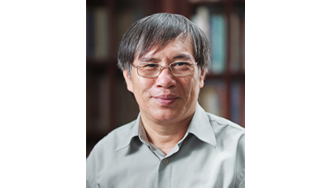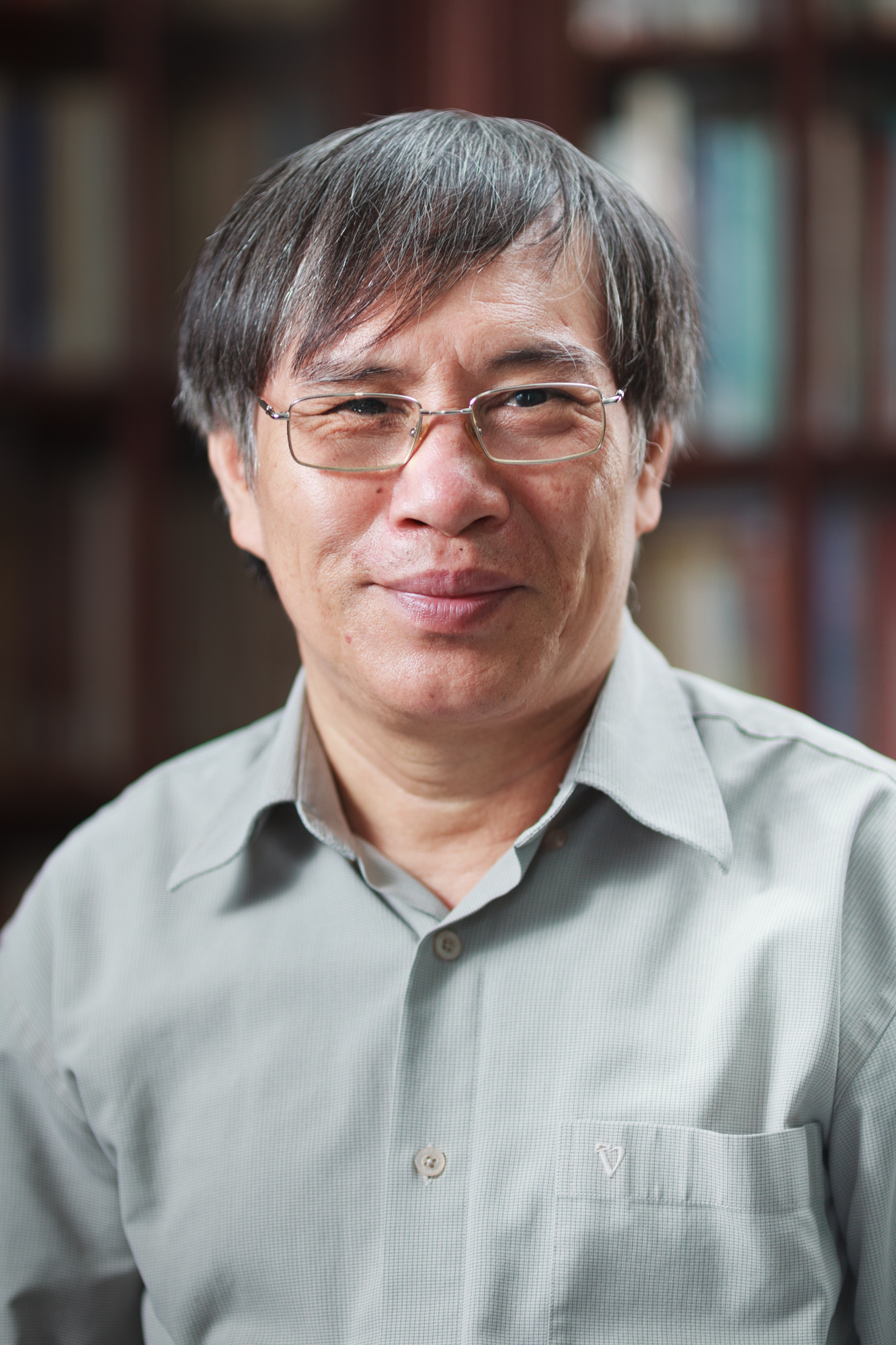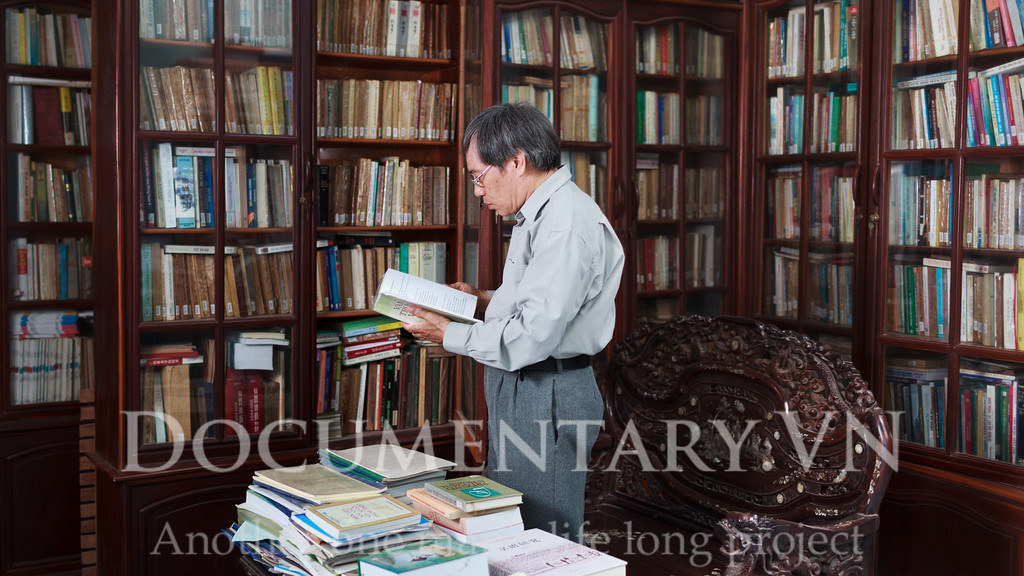
Prof. Dr. Tran Tri Doi graduated from the Faculty of Philology of Hanoi National University in 1977 and has been teaching at the faculty since 1978. Since completing his thesis, he was guided by Prof. Nguyen Tai Can to research the history of Vietnamese, specifically the historical phonetics of Vietnamese. At that time, this was a research direction that not many linguists in Vietnam were interested in. With just one guiding sentence from Prof. Nguyen Tai Can: "Nowadays, there is still a research direction on historical phonetics, I think you are the right person, you should try it", and this field from fate became the career that followed him throughout his life of scientific research. Until 1979, he attended the first course of Associate Professor (now Doctor) training at Hanoi National University and still persistently pursued this field. In his memories of the first steps, he always remembers and appreciates the teachers and seniors in the industry and the Faculty who inspired his knowledge and passion for the field of Vietnamese historical phonetics. They are Professor Nguyen Tai Can, the main supervisor of his PhD thesis, and Professor Hoang Trong Phien, Professor Nguyen Van Tu in the group of thesis supervisors, as well as Professors Phan Ngoc, Pham Duc Duong, Vuong Loc, Dr. Cung Khac Luoc... In the story, he always mentioned his French friends, Professor M.Ferlus - formerlyResearch Directorat CLAO under the French National Research Center (CNRS) and Professor Nguyen Phu Phong. Diligently "seeking teachers" and acquiring knowledge, in the context of domestic documents and experts in this field being scarce, the difficulties and challenges posed to him were not small. When doing his PhD thesis, at the suggestion of Professor Nguyen Tai Can, Mr. Doi visited Professor Phan Ngoc's house countless times to ask about the knowledge of Vietnamese phonetic history in the work of H. Maspero, which Professor Phan Ngoc translated from French. Thanks to that, Mr. Doi was able to complete his thesis well. Professor Tran Tri Doi's main research directions are:Practical Vietnamese, Phonetics and Historical Phonetics, History of Vietnamese, Comparison - History of Ethnic Language Groups;,Language and culture of Vietnamese ethnic minorities; Language and cultural policy and language education issues in the areas of ethnic minorities in Vietnam and Cultural languageandToponymyIn Vietnam.

Professor, Dr. Tran Tri Doi/Photo: Thanh Long
Eager to learn, and above all, realizing that the responsibility of a historical phonetic researcher is to go to the source of the national language life, Professor Tran Tri Doi soon developed his own direction, combining theoretical research with practical fieldwork activities. To do the history of Vietnamese, one must understand the nation. After researching the nation, he realized that the ethnic sector was still thin and had many gaps, and there was not enough human resources to dig deeper into the research. And with the thought "The goal of linguistics is culture"(*), Professor Tran Tri Doi realized that the field of Vietnamese language history is boundless. In 1981, Professor Tran Tri Doi spent more than three months with only a Thong Nhat bicycle traveling throughout the Western region of the three provinces of Quang Binh, Ha Tinh and Nghe An to go to the places, see with his own eyes, and hear with his own ears the Vietnamese - Muong dialects. During that "bare-handed" trip, because he mainly traveled on foot and by bicycle, he "knew" the Vietnamese - Muong language group like the back of his hand. The field trip from then on kept him going, diligently, carefully taking notes and field data to enrich his theoretical knowledge, decode historical phonetic issues and contribute many practical proposals for cultural and social development policies of ethnic groups.
Professor Tran Tri Doi considers fieldwork an essential scientific method in the study of the history of Vietnamese phonetics. The story of his fieldwork trips will probably never end. Professor Tran Tri Doi is called "King Lai Pao" by the people of Tuong Duong, Nghe An for his work in finding and restoring Lai Pao script to become the writing of the Thai people in this locality. This is a type of writing that was very developed in the late 19th century, but by the early 20th century, due to social upheavals, it had disappeared. From 1991 to 1994, together with French professor Michel Ferlus (researcher of East Asian languages at the French National Center for Linguistics), every year the two professors went to Nghe An, climbing mountains and wading streams, visiting the villages upstream of the Nam Pao River. Flipping through each rare ancient document kept in ethnic families in a discrete, individual manner, reading each word, comparing, and selecting each text. In 2007, the professors announced the restoration of Lai Pao script. Currently, more than 200 thousand people in Con Cuong and Tuong Duong districts, Nghe An consider this a Thai script, and organize re-learning to eliminate illiteracy. Not only that, Professor Tran Tri Doi is also known as "King ARem", "King Ruc". From the results of his field research (from 1980 - 1994), a vivid picture of the economic and cultural situation of the three ethnic groups Arem, Ruc, Ma Lieng in Quang Binh was realistically recreated, contributing significantly to the preservation and development of ethnic groups that are at risk of disappearing. Read the book "Economic and cultural status of three ethnic groups at risk of disappearing" (National Culture Publishing House, 1995), I felt 3 things: one, these are meticulous, authentic notes, presented very simply, clearly but have very rare value; two is the ability to generalize, link the fields of linguistic history - ethnology - culture very logically, tightly and flexibly; three is: dedication in research work, despite all difficulties, hardships, even dangers in "sacred forests and poisonous waters", to find the most authentic data. The teacher's field trip also had many "pains". In 1983, he had a trip to Cha Lo pass, then spent 1 month in Bo Trach district hospital because the doctor had to monitor brain problems. Or in 1984, there was a time when he ran out of money, returned to Dong Le station (Tuyen Hoa, Quang Binh) with empty hands.. Mainly walking, rickety bicycles or specialized cars Uses like U-oát, Gat66 to travel on forest roads. In the dry season, the sun is scorching hot, in the rainy season, the road is muddy and slippery. Put cotton in a bottle, pour oil into it so that the cotton absorbs it so that it doesn't spill when walking, when using it, squeeze the oil out of the cotton or put a wick in it... Just like that, carry your backpack and go, there are trips that last several months. But you have to go to get there! Only by going can you see and give suggestions to local managers, such as protecting the forest upstream of the Gianh River; raising the issue of incestuous marriage in response to the question of how to preserve the ARem ethnic group? since 1995, 1996; only by going can you understand the difficulties and deprivation of the people and the sacrifices of teachers in remote and mountainous areas, the challenges in the fight against hunger and ignorance... That's why, sometimes it's really tiring, but the professor in his 60s, when he touches the "itchy spots", is eager to go. Like in 2012, to research the problem To study the illiteracy problem in Dien Bien, he went all the way to Muong Nhe, to a Mong village with only 56 people living there, to conduct a survey. Still, every year he had to go on field trips 3-4 times.

Photo: Jackie Chan
In terms of theory, Professor Tran Tri Doi has contributed many outstanding works. In the research direction of Vietnamese language history - which has very few participants, Professor Tran Tri Doi has outstanding works:Vietnamese history textbook (draft), 2005. This is the first work to systematically present issues related to the origin of Vietnamese in relation to languages of the same group and regional languages, to delineate and briefly examine the stages of development of Vietnamese in history, in the form of a university textbook. He published research results on the history of Vietnamese phonetics and Vietnamese-Muong languages, focusing on the process of forming the tone system and the rules of voiceless and nasalization, in the workSome issues of comparative and historical research on the Viet-Muong language group (2011),set a new milestone for the study of the origin and phonetic history of Vietnamese and other languages in the same group. In the general theoretical system of research on the languages of ethnic minorities in Vietnam, it can be said that Professor Tran Tri Doi is a hard-working person with many resounding achievements. TextbookResearch on languages of Vietnamese ethnic minorities(1999) is the only work in Vietnam that follows the general research direction on ethnic minority languages, from linguistic situations to origin relationships, current usage status, preservation and development policies. In addition, the research direction on origin relationships or contact relationships between ethnic minority languages or between ethnic minority languages with Vietnamese and other languages in the region is the main concern of Professor Tran Tri Doi. The research direction on preserving culture and writing of ethnic minorities is shown through articles on ancient Thai script. Research on language, culture and education policies for ethnic minorities with studies published in 3 booksNational cultural language policy in Vietnam(2003),The current situation of language education in ethnic minority mountainous areas of three northern provinces of Vietnam (2004), The current situation of language use of some ethnic minorities and issues for language education in schools in Viet Bac(2006, co-written with Nguyen Van Loc)...
A special point in historical phonetics research is the need to publish data and research results widely in international professional circles. On the basis of that language to decode linguistic phenomena in the world. Professor Tran Tri Doi has actively participated in professional exchange activities with the international scientific community in the field of historical phonetics from the very beginning. Since 1986, he has been invited to France to discuss research issues. His self-proclaimed "mediocre" French is also due to the process of working with French experts. His audio archive is being invested in digitization to become a common source of documents worldwide. He regularly participates in writing articles and attending international scientific conferences. In 2010, he participated in the doctoral thesis evaluation council at Nancy University (France). In 2012, he presented a paper at the Japanese National Institute of Languages... A great pride in the teaching and scientific research career of Professor Tran Tri Doi is that many French, Japanese, Canadian, Russian... students have claimed to be his students through reading his books, calling him "Teacher" in Vietnamese even though he has never taught them.
I dare to ask you: Have you ever felt lonely, because until now no one (can) follow your language research method? You laughed: "... It's true that not everyone rushes into this difficult place. But if not, the nature of the problem cannot be found. Fortunately for you, the results you have obtained have been and continue to contribute to the development of science and practical application, social development. Not only in Vietnam but also in the world, this research direction and method is very much needed." I still ponder the image of a teacher, a dedicated, assertive and determined scientist, who walks alone on his path of scientific research. However, the respect and admiration of colleagues, of students, along with the valuable recognition and support from international research organizations and especially the precious affection of ethnic minorities in all the places you have been, perhaps make you never feel lonely.
|
PROFESSOR, DOCTOR TRAN TRI DOI
+ Work unit: Department of Linguistics. Center for Research and Development of Ethnic Minorities & Mountainous Areas and Red River Basin. + Management position: Head of the Department of Linguistics (2004-2009). Head of the Department of Languages and Cultures of Vietnamese Ethnic Minorities, Faculty of Linguistics (1996 to present). Director of the Center for Research on the Development of Ethnic Minorities, Mountainous Areas and the Red River Basin, University of Social Sciences and Humanities (2008 to present).
1.Les initiales */s,z/ et */h/ du proto Viet – Muong (PVM) et leurs changements dans le Vietnamien, Journal of Mon-Khmer Studies, Bangkok-Dallas, (25)1996, pp. 263-268. 2. Research on languages of ethnic minorities in Vietnam, Hanoi National University Publishing House, 1999, 2000. 3. Some issues of comparative study of the history of the Viet - Muong language group), National University Publishing House, Hanoi, 2011. 4. Vietnamese history textbook (draft), Hanoi National University Publishing House, 2005, 2007; reprinted with additionsVietnamese history textbook, Vietnam Education Publishing House, Hanoi 2011. 5. Language families in Vietnam(The language Families in Vietnam),National University Publishing House, Hanoi 2015.
+ Scientific Research Encouragement Prize for the projectFolktales of the Nguon peopleof the Vietnam Folk Arts Association, 1993. + Scientific Research Encouragement Prize for the projectAre the Arem, Ruc and Ma Lieng ethnic groups in Quang Binh disappearing?of the Vietnam Folk Arts Association, 1996. + Third prize in annual scientific research for the projectLanguage and traditional cultural development of ethnic minorities in Vietnamof the Vietnam Folk Arts Association, 1998. + Second Prize B Annual Scientific Research for the projectAbout the work Dang Hanh and the Conference Table of the Dao people in Thanh Hoaof the Vietnam Folk Arts Association, 2008. + Second Prize B Scientific Research for the projectProverbs and idioms of the Thai Muong people (in Tuong Duong, Nghe An) – bilingualof the Vietnam Folk Arts Association, 2010. + Second Prize B Scientific Research for the projectProverbs and idioms of the Thai Muong people (in Tuong Duong, Nghe An) - bilingualVolume IIof the Vietnam Folk Arts Association, 2011. |
Author:MSc. Le Thu Ha